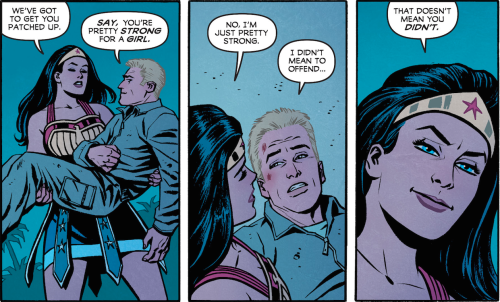2020.04.10

I'm mulling this over in the context of increased awareness of my deeply ingrained worldview, the closest thing to faith that I possess: objective Truth - the most correct and universal way of interpreting a situation and providing us instructional "shoulds" - exists, but it is obscure, and it is as incorrect to lightly dismiss someone else's belief in what that Truth is (they may be more correct than you!) as it is to say "the objective Truth doesn't exist, and so therefore everyone can have their own Truth that is equally as valid."
In this context, Steve Trevor's semi-apology has three different framing interpretations:
- Steve's blunder should be overlooked, because his intent was good
- Steve's blunder should be dwelled upon, because Wonder Woman was offended
- Steve's blunder should be dwelled upon, because what he said was objectively objectionable
From a gender and race studies perspective, the crucial point is: who gets to control the narrative. Who determines what is objectively objectionable? No wonder transgressors get so defensive; they are often acting from a place of security and privilege, and that position is threatened if it is the transgressed against who are in control of reality and interpretation.
I guess the defense from the transgressors side is: but you know, some kind of reality does exist, it's crucial that we be as sober as possible in our assessment of it, and to allow anyone to manufacture insult + injury would lead to chaos, the potential for anyone to sow invisible rhetorical minefields of tremendous destructive power with claimed offence.
But neither side will fully trust the other. The accused transgressor can claim good or neutral intentions, but that claim is of an internal state and as difficult to prove as the received transgression. Furthermore, there's the "ignorance of the law is no defense" aspect too - that people should be expected to understand what is offensive, and that a kind of willful or neglectful ignorance of that is in itself an offence.
I do hope people get better at giving each other the benefit of the doubt: that felt offences are real, and being described proportionately, but that relatively few people we're engaging with have malice in their heart and are being deliberately offensive, and also a hurtful remark doesn't have to be a defining characteristic of that speaker.
